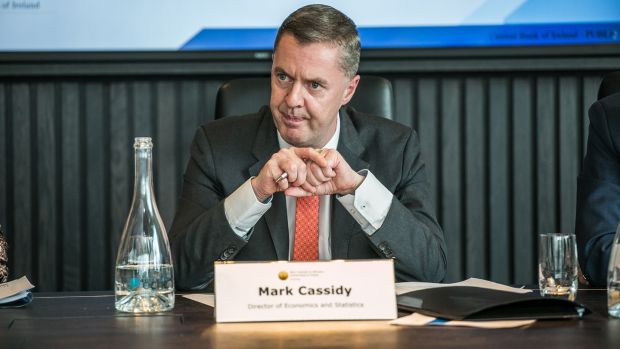PHOTO: Mark Cassidy, director of economics and statistics at the Central Bank of Ireland
Up to 167,000 jobs could be created in the Irish economy over the next two years as it shrugs off the effects of the pandemic and consumer spending returns to more normal levels, the Central Bank has said.
In its latest quarterly bulletin, the regulator, however, warned that higher levels of inflation linked to surging energy prices would persist in the short term, resulting in what it described as “generalised cost of living increases”.
The economy is expected to grow by 8.7 per cent this year and by 5 per cent next year on back of strong domestic demand supported by income growth, the use of savings built up during the pandemic and strong exports.
This, it said, would result in a more rapid reduction in unemployment than previously anticipated and a return to full employment by 2024. Unemployment, which is at 7 per cent, is expected to fall to 5.3 per cent next year and to 4.9 per cent in 2024.
The transformed economic outlook is also expected to translate into higher taxes for the Government and improved public finances. The Government is expected to run a modest budget surplus next year.
“Despite the emergence of the Omicron variant, the economy overall is proving resilient,” said the Central Bank’s director of economics and statistics, Mark Cassidy.
“With strong growth in employment and activity, the economy is already back to its pre-pandemic level, and we expect will reach its potential level of activity over our forecast horizon to 2024,” he said.
However, Mr Cassidy cautioned that the data masked “the fact that some parts of the economy, particularly hospitality and the arts, are still bearing significant costs arising from Covid”.
A separate study by the Economic and Social Research Institute (ESRI) and the Department of Finance, published earlier this week, suggested there are about 50 per cent more loss-making firms in the Irish economy as a result of the pandemic.
In its report, the Central Bank also highlighted the recent increase in inflation, which rose to a 21-year high of 5.5 per cent in December.
The combination of a surge in demand, supply bottlenecks and the sharp rise in energy prices is leading to higher inflation in the near term, but this is expected to ease later in the year “as acute pandemic-related effects and energy price growth diminish in importance”, it said.
That is in line with the view of the European Central Bank. However, the International Monetary Fund (IMF) warned yesterday that elevated rates of inflation would persist for longer than expected as supply-chain disruption and high energy prices persist in 2022.
It drew particular attention to the United States, where headline inflation is now running at a 40-year high of 7 per cent.
Wage-price spiral
Regulators and central banks fear that if companies and workers try to insulate themselves against inflation by raising prices and driving up wage demands, it could trigger a wage-price spiral.
The Central Bank said that while there was some evidence of wage pressures emerging, wage increases are not broadly based, reflecting labour shortages and productivity increases in some sectors rather than generalised cost of living increases.
As the labour market tightens, however, it warned the potential existed “for second-round effects” through higher wages and other business costs being passed through to consumer prices in the years ahead.
The regulator also highlighted that planned public and private spending increases on housing could run up against capacity constraints, resulting in higher costs. That warning comes as new figures show some €10.5 billion worth of home loans was drawn down by borrowers in 2021, the highest level since the financial crash more than a decade ago.










